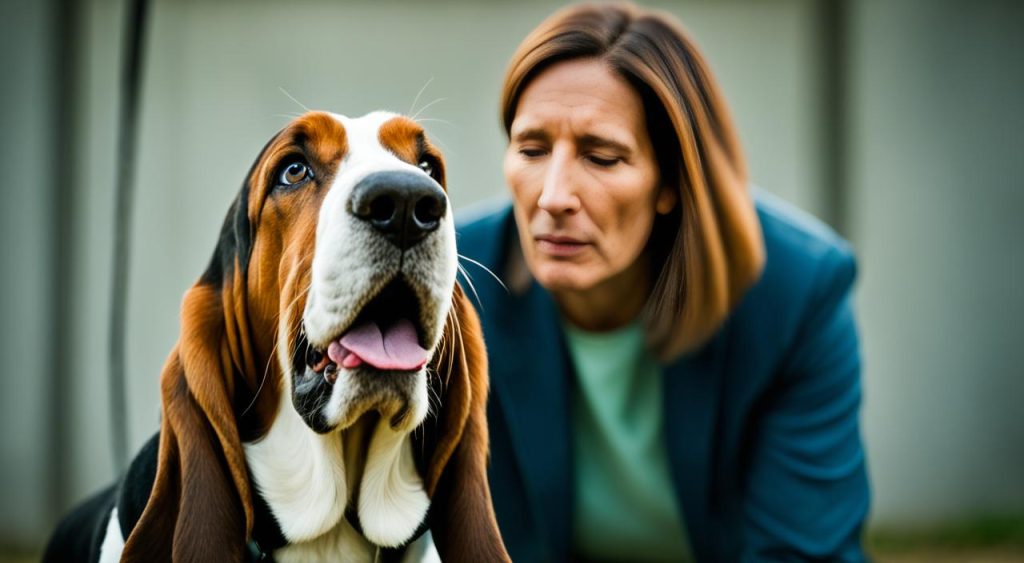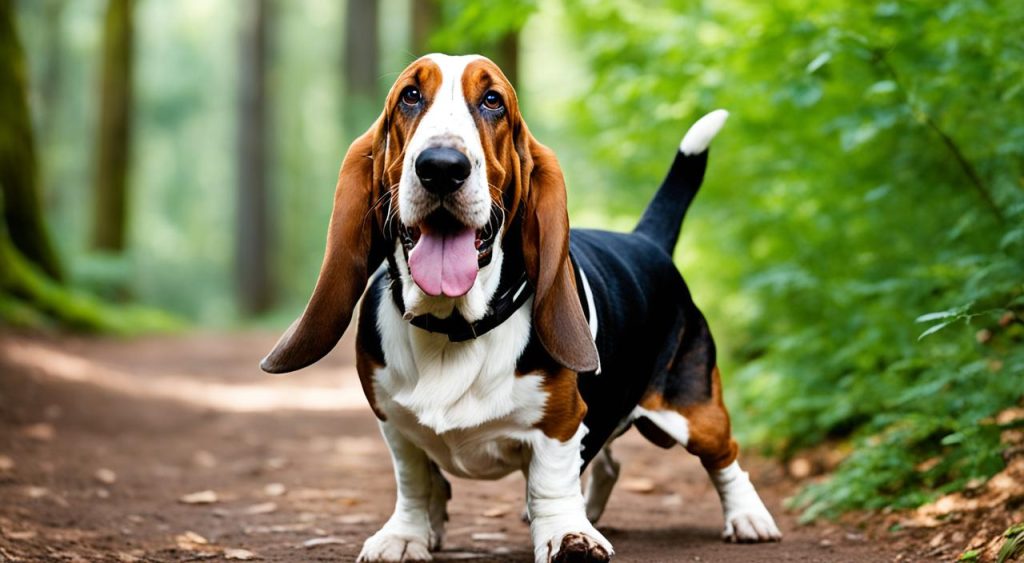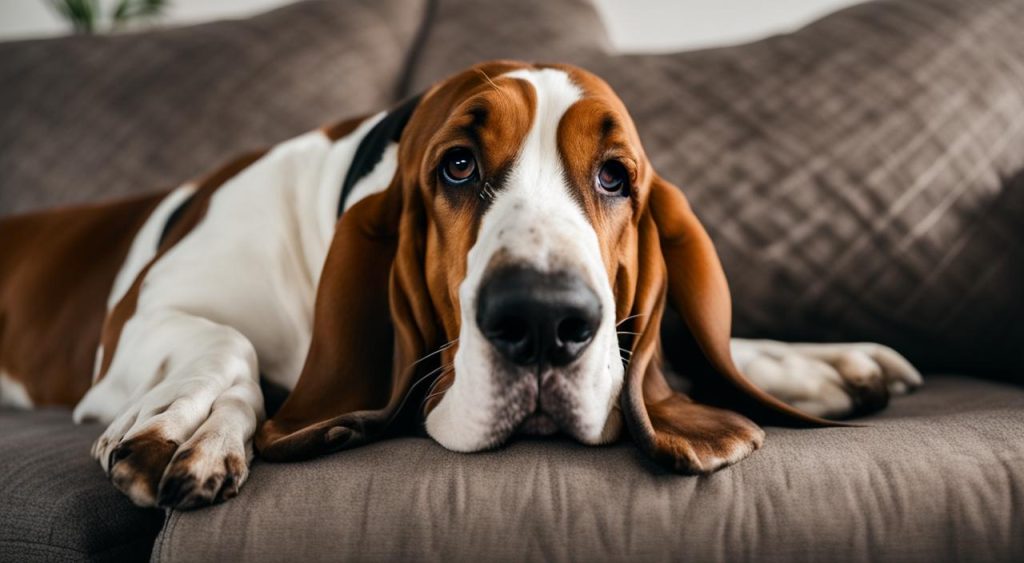Basset Hounds are known for their friendly and non-aggressive temperament, which may lead you to wonder if they are protective of their owners. While they are not typically considered aggressive guard dogs, Basset Hounds can be trained to exhibit protective behavior. Their calm and laid-back demeanor means they are more likely to greet strangers with affection rather than aggression. However, their physical characteristics, including their stocky build and unique appearance, can serve as deterrents to potential intruders. Additionally, their acute senses, such as their keen sense of smell and excellent hearing, allow them to be alert to their surroundings. Although they may not display aggression, Basset Hounds can alert their owners to the presence of intruders.
Key Takeaways:
- Basset Hounds are not naturally aggressive guard dogs but can be trained to exhibit protective behavior.
- Their calm and laid-back demeanor makes them more likely to greet strangers affectionately.
- Their physical characteristics, such as their stocky build and unique appearance, can deter potential intruders.
- Basset Hounds have acute senses, including a keen sense of smell and excellent hearing, making them alert to their surroundings.
- Training plays a crucial role in developing a Basset Hound’s guarding abilities, including socialization, obedience training, and alert command training.
The Unique Characteristics of Basset Hounds
Basset Hounds possess a combination of physical traits, temperament, and alertness that sets them apart and contributes to their potential as guard dogs. The distinct physical appearance of Basset Hounds, with their stocky build and signature wrinkles, can give them a more imposing presence than they actually have. However, their temperament is generally calm and laid-back, making them friendly and affectionate towards both their owners and strangers.
While Basset Hounds are not naturally territorial or overly protective, their acute senses make them highly alert to their surroundings. With a keen sense of smell and excellent hearing, Basset Hounds can detect unusual sounds and scents that may go unnoticed by humans. This heightened alertness is a valuable trait in a guard dog as it allows them to sense potential threats before they escalate.
Training a Basset Hound as a Guard Dog
Training is crucial in developing a Basset Hound’s guarding abilities. To unlock their potential as guard dogs, you need to start with early socialization to build their confidence and reduce fearfulness. By exposing them to different people, environments, and situations, you will help them become comfortable and well-adjusted.
Obedience training is another essential aspect of Basset Hound guard dog training. Teaching them basic commands like “sit,” “stay,” and “come” establishes a foundation for their training. By following your commands, they will learn discipline, control, and responsiveness, important traits for a successful guard dog.
“Consistency in training efforts, regular practice, and reinforcement of commands are key to a Basset Hound’s success as a guard dog.”
In addition to basic obedience, it’s important to train Basset Hounds with specific alert commands. Commands like “bark” or “alert” can be trained to help them respond to potential threats. These commands enable them to vocalize their presence and alert you to potential dangers, making them valuable allies in protecting your home.
Positive reinforcement is the cornerstone of Basset Hound guard dog training. Rewarding them with treats and praise when they display the desired behavior will encourage their guard dog instincts and motivate them to continue performing well. This positive experience will help strengthen the bond between you and your Basset Hound, making the training process enjoyable for both of you.
Consistency, Practice, and Reinforcement
Consistency is crucial throughout the training process. By maintaining a consistent approach, you will help your Basset Hound understand what is expected of them. Regular practice sessions will reinforce their training, allowing them to retain and improve their skills over time. Continuously reinforcing commands and behaviors will solidify their training and help ensure their success as a guard dog.
Limitations of Basset Hounds as Guard Dogs
While Basset Hounds can be trained to be effective in certain guard dog roles, it’s important to acknowledge their limitations. Basset Hounds are not naturally aggressive dogs and may not be as intimidating to determined intruders. Their lack of aggression, combined with their physical limitations, can impact their effectiveness in certain security situations.
Their short legs and heavy bodies may limit their ability to physically intervene in a threat situation. While Basset Hounds have a unique appearance that can serve as a visual deterrent, their physical attributes may not provide the necessary agility or strength to confront an intruder.
“Basset Hounds are known for their friendly and non-aggressive temperament, which is great for family environments but may not make them the best choice for a guard dog,” says dog behavior expert Dr. Emma Thompson.
Additionally, Basset Hounds have a distinctive, loud baying bark that can serve as an alert but may not be suitable for all living situations. This noise level is inherent to their breed and is a natural characteristic of Basset Hounds. While their bark can certainly alert their owners to potential threats, it may also lead to noise complaints from neighbors in certain residential settings.
Overall, while Basset Hounds can contribute to home security as alert dogs, their lack of aggression, physical limitations, and noise level should be considered when evaluating them as guard dogs. If you require a more aggressive and physically imposing guard dog, it may be best to explore other breeds that are better suited to fulfill those specific requirements.
Basset Hounds as Family Dogs
While Basset Hounds may not be typical guard dogs, they excel as family dogs. They are known to be loving, friendly, and outgoing, making them a great companion for both children and other pets. Their easygoing nature and playful disposition make them a joy to be around. Basset Hounds are patient and tolerant of noise and lots of activity, making them well-suited for families with children. They are loyal and protective of their families, including children, and will naturally look out for their well-being.
Conclusion
In conclusion, Basset Hounds may not fit the traditional mold of aggressive guard dogs, but they possess remarkable qualities that make them effective in certain guard dog roles. With proper training and socialization, Basset Hounds can exhibit protective behavior towards their owners. Their alertness, unique appearance, and acute senses contribute to their role as guardians.
However, it’s important to acknowledge their limitations. Basset Hounds are not naturally aggressive and may not intimidate determined intruders. Their physical characteristics, such as their short legs and heavy bodies, may limit their ability to physically intervene in threat situations. Additionally, their distinctive baying bark, while useful as an alert, might not be suitable for all living situations.
When choosing the right guard dog, consider your specific needs and expectations. Basset Hounds can be an excellent choice if you prioritize their friendly temperament, loyalty, and compatibility with children and other pets. However, if you require a more aggressive and physically imposing guard dog, it may be necessary to explore other breed options. Ultimately, finding the perfect guard dog depends on your unique circumstances and preferences.





